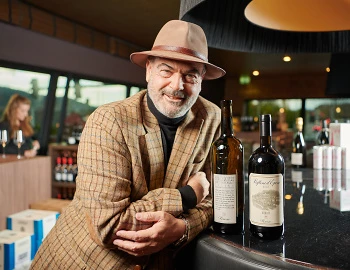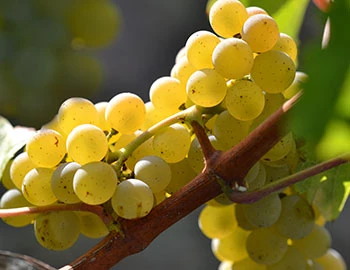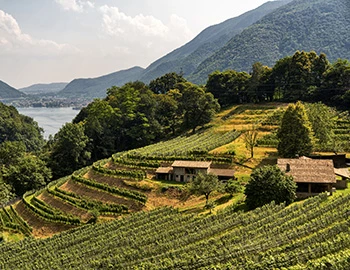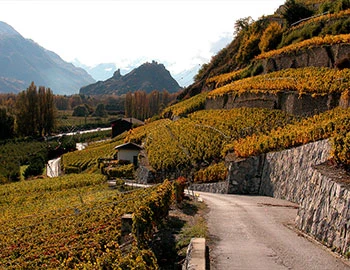Ronco Bain 2022
DOC Ticino, Brivio, 750 ml

| Grape variety: | Sauvignon Blanc |
| Producer: | Brivio / Gialdi |
| Origin: | Switzerland / Tessin / Sottoceneri |
| Other vintages: |
Description
Pale golden yellow with bright green tinge. Aromas of freshly cut grass, elderflower, grapefruit and gooseberry. On palate, the wine is intense and harmonious. A very fruity Sauvignon Blanc with a mineral finish.
Attributes
| Origin: | Switzerland / Tessin / Sottoceneri |
| Grape variety: | Sauvignon Blanc |
| Label: | Vegan |
| Ripening potential: | 1 to 5 years after harvest |
| Drinking temperature: | 10 to 12 °C |
| Food Pairing: | Sushi, Sashimi, Ceviche, Vitello tonnato, Mussels au gratin |
| Vinification: | partly destemmed, fermentation in steel tank, soft pressing |
| Harvest: | hand-picking, strict selection |
| Maturation: | in steel tank |
| Bottling: | filtration |
| Volume: | 13.0 % |
| Note: | Contains sulphites |
Brivio / Gialdi
For most of wine lovers in Switzerland, the name Guido Brivio is no unknown. However, abroad, it is a different story. Only after many years in the trade has he become among the wine experts and professionals of New York or London an insider tip, so to say, from an infinitesimally tiny unknown corner in the great international wine world.
Although Guido’s grandfather was a wine merchant, he didn’t grow up in this industry, or even on a wine estate. At home, life didn’t revolve around grapes, but artichokes! His mother and uncle jointly possessed the Swiss production rights for Cynar. Only after studying business in London did the young Guido decide to study oenology in Bordeaux. His mother was delighted, as she saw that a certain family tradition could now continue. There then followed a stay in Sonoma Valley, California, where he became acquainted with American wine producers’ carefree, adventurous way of working.

Sauvignon Blanc
The Sauvignon blanc can be recognized with your eyes closed. Its typical bouquet is marked by green notes: freshly cut grass, tomato bunches, gooseberry. Citrus fruits, cassis and flint join into the mix. In warmer latitudes it also shows exotic aromas, such as passion fruit. Its acidity is decidedly lively. In all likelihood, it comes from the Loire Valley, where it is vinified in Pouilly-Fumé and Sancerre in its purest form: varietally, and without timber. In the 18th century, it found its way to Bordeaux. Ambitious producers assemble it there with Sémillon into substantial whites, which are aged in oak barrels. The Sauvignon blanc has been a sensational success in the past 20 years in New Zealand. With its refreshing sweet-and-sour style, winemakers from down under have conquered the world. The rich Sauvignons from Styria and crisp examples of South Tyrol and Friuli are worth mentioning as well. It pairs with anything from the sea. Or do it like they do on the Loire, and enjoy it with goat cheese.

Tessin
Ticino: the Merlot Mecca of Switzerland
Ticino winegrowing is thought to date from Roman times, as early as 2000 years ago. But the foundation for today’s viticulture was laid just over 100 years ago, in 1907. It was then that the first Merlot vines were planted at Castelrotto in Malcantone. Since then, the variety has emerged triumphant here. Top selections matured in barriques more than measure up to those from Bordeaux’s Saint-Émilion or Pomerol regions.

Switzerland
Switzerland – A small country with enormous diversity
Switzerland is famous for its banks, watches, and cheese, but not necessarily for its wine. The Swiss didn't invent wine, but they have been extremely open and curious to it. Wine culture arrived in what is now modern Switzerland via several routes: from Marseilles to Lake Geneva and the Lower Valais region; from the Aosta Valley through the Great St. Bernard Pass to the rest of Valais; from the Rhone through Burgundy, across the Jura Mountains to Lake Constance; and from Lombardy to Ticino, and then on to Grisons.



